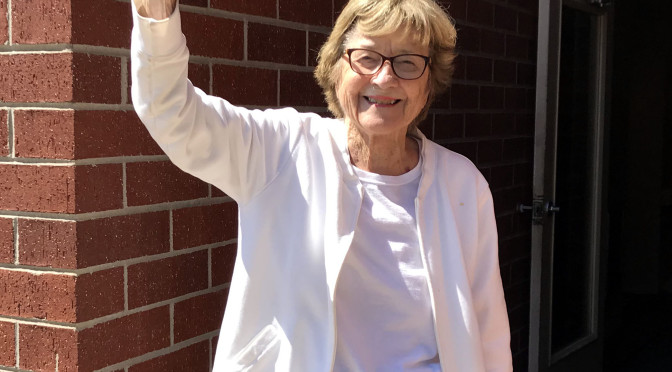**sermon art: Choppy River by NearOf, 2014
Caitlin Trussell with Augustana Lutheran Church on February 18, 2024
Mark 1:9-15
Pat Milberry is a pro snowboarder and artist who was born and raised in Colorado’s Eagle River Valley.[1] He knows the roads and respects the weather that changes road conditions within minutes. In January, he was driving his art to donate at a charity event in Silverton. His route went over Red Mountain Pass on the Million Dollar Highway. Blizzard conditions iced the road and obscured visibility. As Pat was inching along, he felt both his driver’s side tires slip off the edge of the highway. He knew that if he tried to steer back towards the road that his truck would flip and roll down the mountain. So what did he do? He cranked his steering wheel as hard as he could to turn into the abyss. He said that, “I just decided to drop in.” He dropped in like he would have if caught in an avalanche! Straight down the mountain! Hitting trees. Shattering glass. Until, two large trees stopped his careening descent. He walked away from that one. What hardly computes is that “dropping in” saved him after edging off of the cliff.
Some of you may see where this is going. Our theme for Lent gathers us by the promises of baptism. This makes sense because, historically, Lent was a time when converts into Christianity prepared for Easter baptisms. We join them to make a hard turn to drop in those choppy baptismal waters and we’re going to see where it takes us. The baptism ritual is beautiful and powerful but underlying the still water is the Spirit, the Holy Spirit.
The Gospel story today is sparsely narrated. If Mark had used any fewer words, we’d be in bullet point territory. Yet a lot is happening here. Mortal peril abounds. After John baptized Jesus, John was arrested while Jesus resisted evil in the wilderness. Even with the chaos of John being arrested, Jesus’ preached the good news of God, “The time IS fulfilled, and the kingdom of God HAS come near; repent, and believe in the good news.” This three-part story, brief as it is, dropped Jesus’ into his ministry of healings, forgiveness, transformation, and liberations from the bondage of evils.[2] The heavens ripped apart and the Spirit landed on a soggy Jesus in the Jordan River and he was dropped in the wilderness with wild beasts and angels for company. This story is wild and thrilling. The calm waters of our baptismal fonts veil the raw power of Spirit who anoints us with the good news of God’s promises. God promises to always be present even, and maybe especially when we don’t feel worthy; to always take us back through forgiveness when we turn our backs on God; to make our lives ever more Christ-shaped as disciples; and to keep these promises forever as the eternal God.
The first promise we make in response to God, just before we’re baptized is “to live among God’s faithful people.” I, for one, am grateful that it doesn’t say perfect people. Faithful is hard enough. But the same Spirit alive in our baptisms is the Spirit who bestows faith in us. So we promise for our babies or for ourselves as we’re baptized to live among God’s faithful people. It’s easy to lose sight of the radical nature of our lives together as the church. But baptism steers us toward a hard turn to drop in those choppy baptismal waters.
Last week we celebrated our volunteers and we did something we don’t ordinarily do. We asked everyone who volunteers their time within this congregation in any capacity to move into the aisles and towards the front. It was messy and confusing and took time, none of which is part of how we usually roll here. But what it did was make visible the often-invisible work of the church. What you may have missed was the blessing at the end, when I moved 360 degrees to speak the blessing over everyone whether sitting or standing. You see, to live among God’s faithful people means all of us. The Spirit touches all of us no matter what we do or don’t do. God has a sense of humor that way. God’s good news means that anything we do is in response to what God has already done. Remember the Bible story? Jesus preached that the time IS fulfilled, and the kingdom of God HAS come near. The Spirit isn’t just a cheerleader for Jesus. The Spirit instigates the dismantling of power to make room for the kingdom of God to take hold.
We promise to live among God’s faithful people because God is faithful to us. Gathered by God’s promises, we worship and celebrate the extravagant grace squandered on us unconditionally. Our worship is counter cultural. Meaning that we willingly show up to sing among friendly strangers, or strange friends as the case may be. Our singing praises a God who is revealed in the 2,000-year-old ministry, death, and resurrection of Jesus. We give our money to the project of God’s good news of unconditional love and then we show up to hear preaching that comforts the afflicted and afflicts the comfortable. Who does that?!! God’s faithful people, that’s who. Making a hard turn to drop into the choppy waters of baptism is a wild ride.
Our life together is a promise we make to God. Our life of unity in the gospel isn’t one of uniformity. It’s easy to forget that because our worship liturgy unites our voices in scripture, prayers, creeds, and song. While we worship the same God, we are not the same. God’s faithful people are diverse which means we likely disagree as much as we agree. Our gifts and skills are different. Our ideas are different. Combining these differences into our life together as the church takes trust and courage as much as it takes humility and forgiveness. Thankfully, we have Jesus who led as a loving servant, not as an arrogant overlord. Perhaps his time being served by angels in the wilderness, with wild beasts as his companions, gave Jesus a taste for service and encouragement as a survival skill which he then passed on to us. Hang on folks, dropping in the waters of baptism calls us into connection and showing up for each other.
Dr. Vivek Murthy, the U.S. Surgeon General has declared an Epidemic of Loneliness and Isolation in an 82 page, 2023 report.[3] Loneliness affects our health and accelerates our deaths. The antidote? The “Healing effects of social connection and community.” As we promise to live among God’s faithful people, we have the opportunity to encourage, serve, and connect with each other as Jesus taught us. As we are encouraged by each other, we increase our capacity to serve and encourage other people. This is how living among God’s faithful people works. Dropped in the choppy waters of baptism, the power of the Holy Spirit connects us to the love of God in Christ Jesus our Lord. In turn, we get to do the same for the world God so loves. Hang on tight. This thing could get out of control.
______________________________
[1] Jason Blevins, “Pat Milberry felt his tires tip off the precipitous Red Mountain Pass in a snowstorm. So he dropped in.” The Colorado Sun – February 7, 2024. Pat Milbery felt his tires tip off the precipitous Red Mountain Pass in a snowstorm. So he dropped in. – The Colorado Sun
[2] David Schnasa Jaocobsen, Bishops Scholar in Homiletics and Preaching; Director of the Homiletical Theology Project, Boston University School of Theology.
[3] Epidemic of Loneliness and Isolation, The U.S. Surgeon General’s Advisory on the Healing Effects of Social Connection and Community, 2023. Our Epidemic of Loneliness and Isolation (hhs.gov)

![Dropped In Choppy Waters [OR Gathered by Promises] Mark 1:9-15](https://caitlintrussell.org/wp-content/uploads/2024/02/choppy_river_by_nearof_2014-672x372.jpg)

